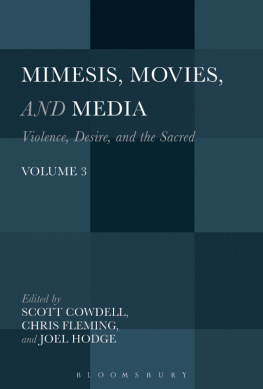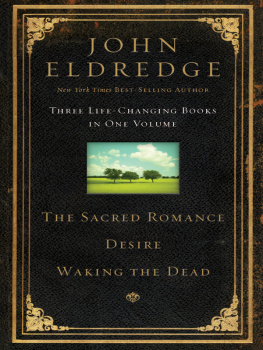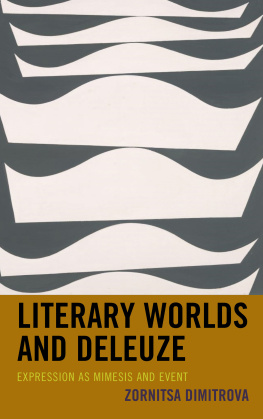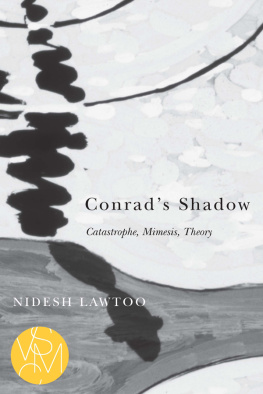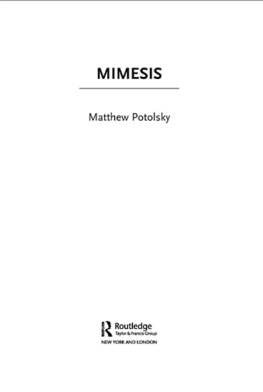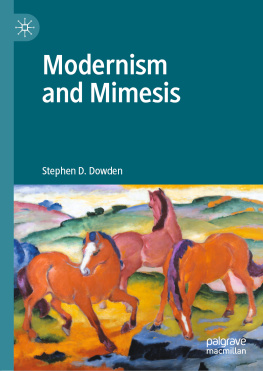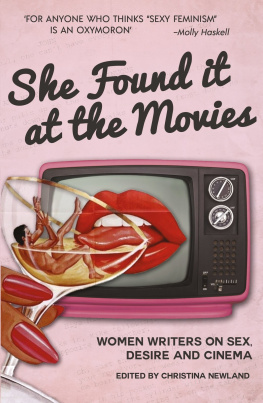Scott Cowdell - Mimesis, Movies, and Media: Violence, Desire, and the Sacred
Here you can read online Scott Cowdell - Mimesis, Movies, and Media: Violence, Desire, and the Sacred full text of the book (entire story) in english for free. Download pdf and epub, get meaning, cover and reviews about this ebook. year: 2015, publisher: Bloomsbury, genre: Romance novel. Description of the work, (preface) as well as reviews are available. Best literature library LitArk.com created for fans of good reading and offers a wide selection of genres:
Romance novel
Science fiction
Adventure
Detective
Science
History
Home and family
Prose
Art
Politics
Computer
Non-fiction
Religion
Business
Children
Humor
Choose a favorite category and find really read worthwhile books. Enjoy immersion in the world of imagination, feel the emotions of the characters or learn something new for yourself, make an fascinating discovery.
- Book:Mimesis, Movies, and Media: Violence, Desire, and the Sacred
- Author:
- Publisher:Bloomsbury
- Genre:
- Year:2015
- Rating:5 / 5
- Favourites:Add to favourites
- Your mark:
- 100
- 1
- 2
- 3
- 4
- 5
Mimesis, Movies, and Media: Violence, Desire, and the Sacred: summary, description and annotation
We offer to read an annotation, description, summary or preface (depends on what the author of the book "Mimesis, Movies, and Media: Violence, Desire, and the Sacred" wrote himself). If you haven't found the necessary information about the book — write in the comments, we will try to find it.
Scott Cowdell: author's other books
Who wrote Mimesis, Movies, and Media: Violence, Desire, and the Sacred? Find out the surname, the name of the author of the book and a list of all author's works by series.
Mimesis, Movies, and Media: Violence, Desire, and the Sacred — read online for free the complete book (whole text) full work
Below is the text of the book, divided by pages. System saving the place of the last page read, allows you to conveniently read the book "Mimesis, Movies, and Media: Violence, Desire, and the Sacred" online for free, without having to search again every time where you left off. Put a bookmark, and you can go to the page where you finished reading at any time.
Font size:
Interval:
Bookmark:
Mimesis, Movies, and Media
Violence, Desire, and the Sacred
Series Editors:
Scott Cowdell, Chris Fleming, and Joel Hodge
Volumes in the series:
Violence, Desire, and the Sacred, Volume 1:
Girards Mimetic Theory Across the Disciplines
edited by Scott Cowdell, Chris Fleming, and Joel Hodge
Violence, Desire, and the Sacred, Volume 2:
Ren Girard and Sacrifice in Life, Love and Literature
edited by Scott Cowdell, Chris Fleming, and Joel Hodge
Mimesis, Movies, and Media
Violence, Desire, and the Sacred
Volume 3
Edited by Scott Cowdell, Chris Fleming, and Joel Hodge
Bloomsbury Academic
An imprint of Bloomsbury Publishing Inc

For the clergy and people of All Saints Anglican Church, Ainslie, from their Theologian-in-Residence
Scott Cowdell
To Eris and John Fleming, with much love, for all of yours
Chris Fleming
To Ed Conrad, Anne Brown, and Rick Strelan, with heartfelt gratitude
Joel Hodge
Paolo Diego Bubbio (PhD, University of Turin, Italy) is Senior Lecturer in Philosophy in the School of Humanities and Communication Arts at the University of Western Sydney, Australia. He is the author of Il Sacrificio Intellettuale: Ren Girard e la Filosofia della Religione (Intellectual Sacrifice: Ren Girard and the Philosophy of Religion; Il Quadrante, 1999), Il Sacrificio: a Ragione e il suo Altrove (Sacrifice: Reason and Its Other; Citt Nuova, 2004), and is the co-editor of two other books.
Scott Cowdell (PhD, University of Queensland) is an Anglican priest, currently Research Professor in the Public and Contextual Theology Research Centre (PACT) at Charles Sturt University, Canberra, Australia, and Canon Theologian of the CanberraGoulburn Diocese. He is the author of seven books, most recently Abiding Faith: Christianity Beyond Certainty, Anxiety, and Violence (Cascade, 2009) and Ren Girard and Secular Modernity: Christ, Culture, and Crisis (University of Notre Dame Press, 2013). He is completing a second Girard volume for Notre Dame, entitled Non-Violent Theology: Ren Girard and the Drama of Salvation. Scott Cowdell is Founding President of the Australian Girard Seminar.
Rosamund Dalziell (PhD, Australian National University) is an Associate Researcher in the Public and Contextual Theology Research Centre (PACT) at Charles Sturt University, Canberra, Australia. Her publications include Shameful Autobiographies: Shame in Contemporary Australian Autobiographies and Culture (Melbourne University Press, 1999).
Paul Dumouchel (PhD, University of Waterloo, Canada) is Professor of Philosophy at the Graduate School of Core Ethics and Frontier Sciences, Ritsumeikan University, Kyoto, Japan. He is co-author, with Jean-Pierre Dupuy, of LEnfer des choses, Ren Girard et la logique de lconomie (Seuil, 1979), and author of Emotions: essai sur le corps et le social (Les Empcheurs de Penser en rond, 1999). He co-edited, with Jean-Pierre Dupuy, Lauto-organisation de la physique au politique (Seuil, 1983), and edited Violence and Truth: On the Work of Ren Girard (Stanford University Press, 1988). His latest books include Le sacrifice inutile: essai sur la violence politique (Flammarion, 2011), Economia dellinvidia (Transeuropa, 2011), and The Ambivalence of Scarcity and Other Essays (Michigan State University Press, 2014).
Chris Fleming (PhD, University of Western Sydney) is Senior Lecturer in Philosophy in the School of Humanities and Communication Arts at the University of Western Sydney, Australia, and Founding Vice President of the Australian Girard Seminar. He is the author of Ren Girard: Violence and Mimesis (Polity, 2004) and of Modern Conspiracy: The Importance of Being Paranoid (Bloomsbury, 2014), co-authored with Emma A. Jane. He is on the editorial boards of three international journals: Anthropoetics (UCLA), The Open Journal of Philosophy, and Advances in Sociology.
Eric Lawrence Gans (PhD, Johns Hopkins University) is Distinguished Professor of French at the University of California, Los Angeles (UCLA). His was the first doctoral dissertation completed under the direction of Ren Girard. Beginning in 1978, Gans conceived his alternative Girardian account of human culture and its origins, called generative anthropology. In 1995, with a group of former students, he founded the semi-annual online journal Anthropoetics (www.anthropoetics.ucla.edu), and began the online Chronicles of Love and Resentment (www.anthropoetics.ucla.edu/views/Chronicles_home.cfm), which number over 450 items. Since 2007, an annual conference on generative anthropology has been organized by the Generative Anthropology Society and Conference (GASC: http://artsites.uottawa.ca/gasc/en). Eric Ganss 15 books as well as his online essays and scholarly articles deal with a wide range of themes: anthropological, literary-historical, religious, cultural, and linguistic.
Joel Hodge (PhD, University of Queensland) is Lecturer in the School of Theology at the Australian Catholic University (St Patricks Campus, Melbourne), and Founding Treasurer and Secretary of the Australian Girard Seminar. He is the author of Resisting Violence and Victimisation: Christian Faith and Solidarity in East Timor (Ashgate, 2012) and co-editor of Vatican II: Reception and Implementation in the Australian Church (Garratt, 2012).
David Humbert (PhD, McMaster University, Canada) is an Associate Professor in the Department of Religious Studies of Thorneloe College, at Laurentian University in Sudbury, Ontario, Canada. He is the author of articles on Kierkegaard and Kant (Journal of Religious Ethics 2014) and Ren Girard (Contagion 2013), and is completing a book on Girardian theory and the cinema of Alfred Hitchcock.
Nidesh Lawtoo (PhD, University of Washington) is Visiting Scholar in the Humanities Center at Johns Hopkins University, and the recipient of a Swiss National Science Foundation Fellowship for Advanced Researchers. He is the author of The Phantom of the Ego: Modernism and the Mimetic Unconscious (Michigan State University Press, 2013) and the editor of Conrads Heart of Darkness and Contemporary Thought: Revisiting the Horror with Lacoue-Labarthe (Bloomsbury, 2012).
Debra MacDonald (MTheol, University of Auckland) is a Professional Teaching Fellow in New Testament Greek at the University of Auckland, New Zealand. She is currently writing her doctoral thesis on satanic narrative in the Gospel of Luke, intertextuality, and mimetic theory.
John OCarroll (PhD, Murdoch University, Western Australia) is Associate Head of the School of Humanities and Social Sciences at Charles Sturt University, Bathurst, New South Wales, Australia. His publications include Borderwork in Multicultural Australia (with Bob Hodge) (Allen and Unwin, 2006) and Our Fathers: What Australian Catholic Priests Really Think about Their Lives and Their Church (with Chris McGillion) (Garratt, 2011).
Carly Osborn (BA[Hons], University of Adelaide) is a PhD candidate in the Department of English at the University of Adelaide, Australia, applying Girardian theory to late twentieth-century American novels investigating tragedy and the American Dream. She received the Raymund Schwager Memorial Award 2012 for best postgraduate paper at the international conference of the Colloquium on Violence and Religion.
Peter Y. Paik (PhD, Cornell University) is Associate Professor of Comparative Literature at the University of Wisconsin, Milwaukee. He is the author of
Next pageFont size:
Interval:
Bookmark:
Similar books «Mimesis, Movies, and Media: Violence, Desire, and the Sacred»
Look at similar books to Mimesis, Movies, and Media: Violence, Desire, and the Sacred. We have selected literature similar in name and meaning in the hope of providing readers with more options to find new, interesting, not yet read works.
Discussion, reviews of the book Mimesis, Movies, and Media: Violence, Desire, and the Sacred and just readers' own opinions. Leave your comments, write what you think about the work, its meaning or the main characters. Specify what exactly you liked and what you didn't like, and why you think so.

